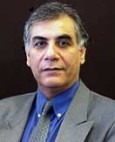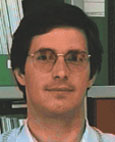|
MAIN
PAGE |
ELMAR-2005
Prof. Mohammed Ghanbari Department of Electronic Systems
Engineering Abstract: With the advances in video compression, it is now possible to send moving sequences of acceptable quality over the mobile-phone like devices. Such advances coupled with the gnawing desire to watch video anywhere, has encouraged multimedia manufacturers to produces various kinds of handsets for multimedia communications. The speech will address some of the issues that make it possible to achieve good quality video at very low bit rates. The codec that has explored all these factors for better compression efficiency is the latest standard video codec, named H.264. The compression efficiency of this codec will be compared with its predecessors, such as H.263 and MPEG-4. Issues for improving the video quality through layered coding, as well the hierarchical modulation that makes layering technique for wireless communications a reality will be discussed. Finally, using the loss concealment techniques to reduce the visual artifacts of channel noise will also be shown. download PPT-presentation in PDF About the Plenary Speaker: Mohammed Ghanbari is the Professor of Video Networking at the Department of Electronic Systems Engineering, University of Essex, United Kingdom. He is best known for the pioneering work on Layered video coding that earned him the IEEE Fellowship. His main research interest is Video compression and transmission of video over networks, the so called video networking. He has published more than 100 Journal papers, 200 international conference papers, eleven Patents on various aspects of video networking. He has authored three books on video and networks, and his book on video coding: an introduction to standard codecs, was awarded the best book of the year 2000 by IEE. Professor Ghanbari has been associate Editor to IEEE Transactions on Multimedia and has been Guest Editor to various Journals. He is also on the advisory board of Image Communications Journal, and is a CEng, FIEE and FIEEE. Plenary Speaker's web-page: http://privatewww.essex.ac.uk/~ghan/
MPEG-21 standard: defining an open Prof. Fernando Pereira Instituto Superior Tecnico - Abstract: Following the development of the MPEG-1,2,4,7 standards, MPEG acknowledged at same stage the lack of a "big picture" describing how the various elements building the infrastructure for the deployment of multimedia applications relate to each other or even if there are missing open standards for some of these elements. To address this problem, MPEG started the MPEG-21 project, formally called "Multimedia framework" with the aim to understand if and how these various elements fit together, and to discuss which new standards may be required, if gaps in the infrastructure exist. Once this work had been carried out, new standards would be developed for the missing elements with the involvement of other bodies, where appropriate, and finally the existing and novel standards would be integrated in the MPEG-21 multimedia framework. The MPEG-21 vision involves the definition of an open multimedia framework to enable the transparent and augmented delivery and consumption of multimedia resources across a wide range of networks and devices used by different communities. The MPEG-21 multimedia framework will identify and define the key elements needed to support the multimedia value and delivery chain, as well as the relationships between and the operations supported by them. This open framework guarantees all content creators and service providers equal opportunities in the MPEG-21 enabled open market. This will also be to the benefit of the content consumers who get access to a large variety of content in an interoperable manner. This presentation will not only address the technical objectives and achievements of the MPEG-21 standard but also its motivation, vision and possible limitations. About the Plenary Speaker: Fernando Pereira is Professor at the Electrical and Computers Engineering Department of Instituto Superior Tecnico. He is responsible for the participation of IST in many national and international research projects. He acts often as project evaluator and auditor for various organizations. He is an Area Editor of the Signal Processing: Image Communication Journal and an Associate Editor of IEEE Transactions of Circuits and Systems for Video Technology, IEEE Transactions on Image Processing and IEEE Transactions on Multimedia. He is an IEEE Distinguished Lecturer, and member of the Scientific and Program Committees of many international conferences. He has contributed more than 150 papers. He has been participating in the work of ISO/MPEG for many years, notably as the head of the Portuguese delegation, Chairman of the MPEG Requirements Group, and chairing many Ad Hoc Groups related to the MPEG-4 and MPEG-7 standards. His areas of interest are video analysis, processing, coding and description, and interactive multimedia services. Plenary Speaker's web-page:
Face recognition: The problems, Prof. Luis Torres Technical University of Catalonia,
Barcelona Abstract: Automatic recognition of people is a challenging problem which has received much attention during the recent years due to its many applications in different fields such as law enforcement, security applications or video indexing. Face recognition is a very challenging problem and up to date, there is no technique that provides a robust solution to all situations and different applications that face recognition may encounter. This presentation will address the problems and the main challenges associated to face recognition and will present a review of some techniques that in some contexts may provide a partial solution to the problem. In addition, approaches using combined information such as image and speech will be also presented. download PPT-presentation in PDF About the Plenary Speaker: Luis Torres received a degree in Telecommunication Engineering from the Telecommunication School of the Technical University of Catalonia, Barcelona, Spain, in 1977, and the Ph.D degree from the University of Wyoming USA, in 1986. He is currently a Professor at the Technical University of Catalonia where he teaches Telecommunication Systems and Advanced Video Coding courses. His main interests are image and video coding, image and video analysis and face recognition. He has been responsible of more than 45 national and international founded projects in very low bit-rate video coding applications, face recognition and MPEG-4 and MPEG-7 standardization activities. Luis Torres has also served in more than 25 international technical conference committees and as a reviewer in many international journals. He has published more than 120 papers in journals and conferences. He is editor along with Murat Kunt of the book "Video Coding: The Second Generation Approach", January 1996. He has also served as coding expert for the European Commission evaluating technical proposals and designing research european programs. He was a Visiting Professor at Purdue University, USA, during the first semester of 2002. Luis Torres is a Senior Member of the IEEE, and current vice-chair of the IEEE IMDSP TC. He has served as Associate Editor for the IEEE Transactions on Image Processing from 1999 till 2003 and has been the General Chair of the International Conference on Image Processing, ICIP, held in Barcelona, September 2003. He is the Special Session Co-chair of ICIP 2005. Plenary Speaker's web-page: http://gps-tsc.upc.es/GTAV/Torres/Members_LLuis.htm
|
||||||||||||


